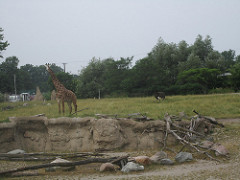For every beast of the forest is mine,
and the cattle upon a thousand hills.
Ps. 50:10
. . . And the vixen ascends, staggering,
On all her cinnamon-colored fours.
And the bear shifts his vision forward,
As if it’s a hop-fingered hand.
And the deer seem older than their own skins,
And the polar owls waste their ermine.
And the bi-colored ducks send out their garrison.
And the two-legged girls stick up out of their stockings,
Exude smoke with their exclamatory mouth buttons
And lie around on benches facing the skies.
We aren’t here just for nothing,
We’re here on business.
Like a conversation before a battle, I sat here.
Trundling my warm belly before me
Like a stroller.
Like a hunter in the islands, I strolled here,
Just like a bar tab, I received honor and flattery,
For any pathetic
Two-winged, four-legged being
Acquires weight here upon presenting a child.
Here natures’ conveyer belts have worked successfully.
Persuasive series of peoples and breeds
Reproduce before your eyes, equip themselves with descendents,
Regardless of the unfreedom and the muzzle on the face.
And as long as round dances dance round beside the pond,
Nature our regimental leader, indulger-and-procuress,
Raises the per capita tax and feasts on the terrace.
But I was always opposed to obligatory Open Sesame!s
And demonstrative leaps through held-up hoops.
And when nitwit-nature would hit the gasses,
I would tend to be motionless from inches to roots.
But when the maternal covered me up to my head,
And showed me faces, persuading me to repeat myself
And toss a couple stitches on the family knitting needles,
Two fingers long—but continue, stretch out on the axis!—
Indifferently and calmly I asserted to them merci.
But what came of that?
And what do we observe here?
What do we laugh at, my soul, and whither do we sob?
Like a little fat-smeared and tubby god
(Names may vary; the thing’s one and the same),
By the waters of zoopolis I eat an obedient cookie,
And eyes of the passersby polish my skin.
Where they go to mock and kiss—
Lowering my reason, today I’ve come to give in.
With pure-hearted knowledge, with a guilty plea
To earn myself a place, like the beaver and zebra,
Between the seasonal molt and the winter sleep
To wall myself off an unrebellious corner,
To lie down on the cement floor, to love the bars—
The faithful carcass of my imminent nesting.
Here I am and here I lay down my raptures.
Here I am and I’ll re- and pro-duce myself
With each lump of food and mug of water,
Entrusting firmness and many meanings to my body:
Perhaps two-facedness, or perhaps mating for life.
Here, where they trade in balloons and juice,
Where men carry daughters on their shoulders,
Here it’s time for me to assume my rightful rank:
So I can be enthroned beside “antelope” and “falcon”:
A superfluous witness beside an emptied grave.
Like nanny and nurse, sleeping over my own womb.
Translated by Sibelan Forrester




